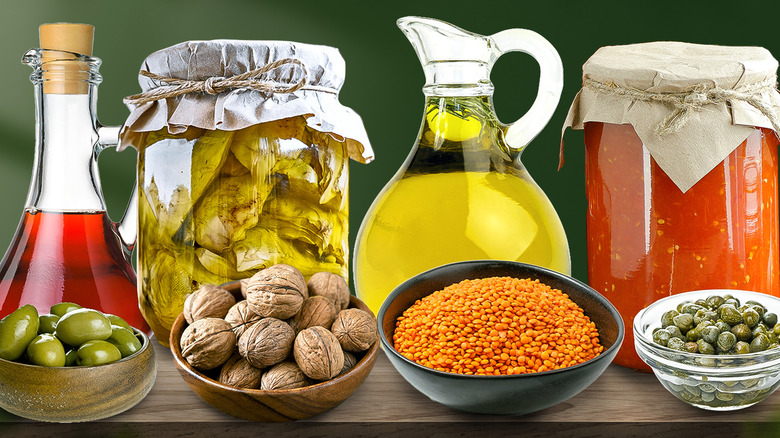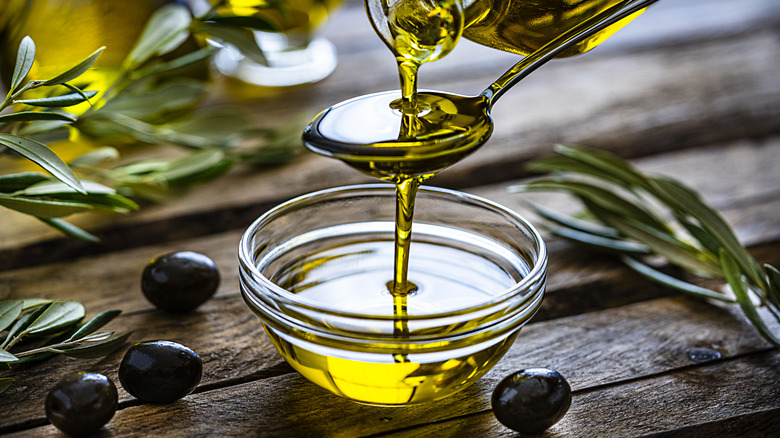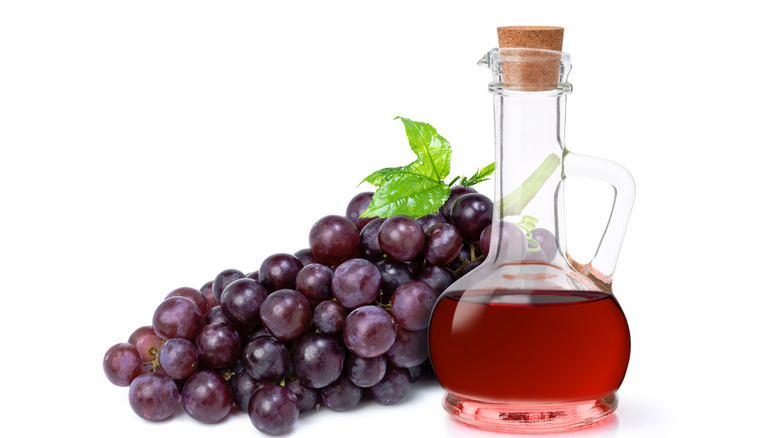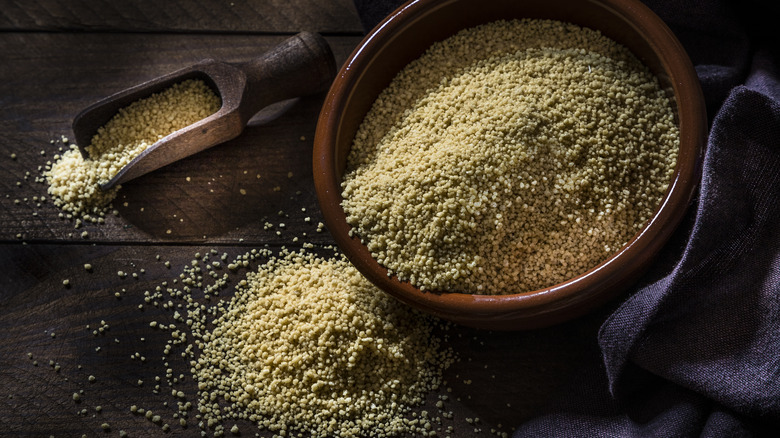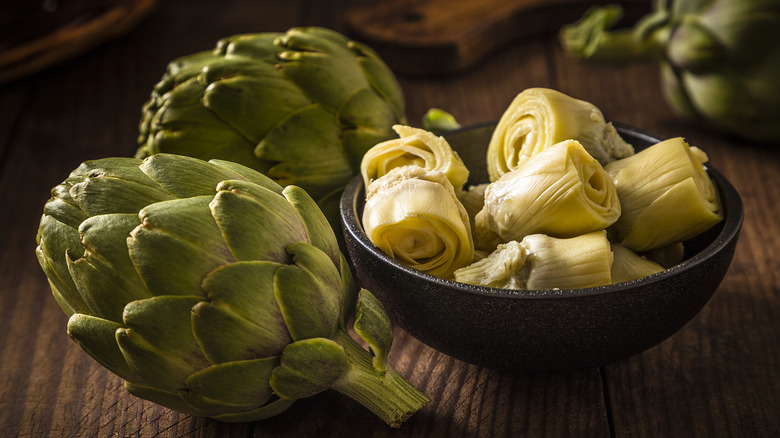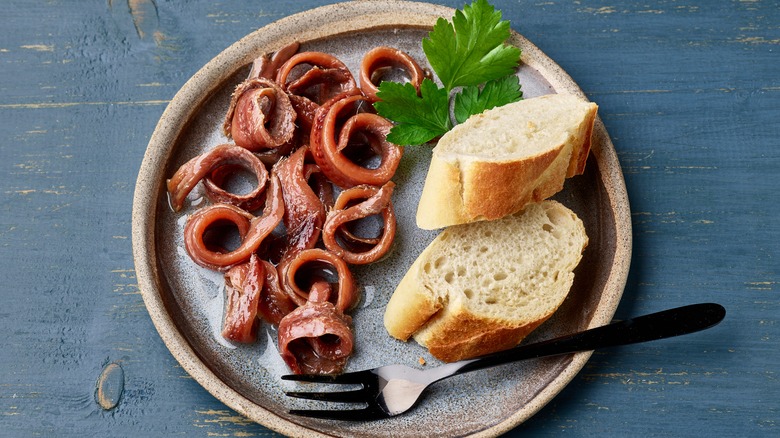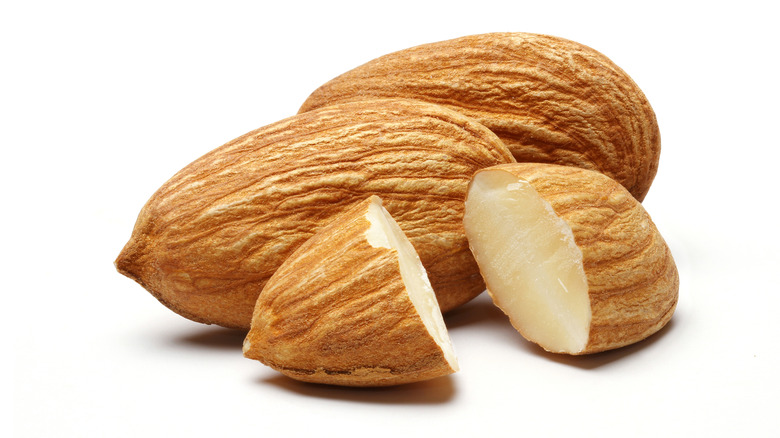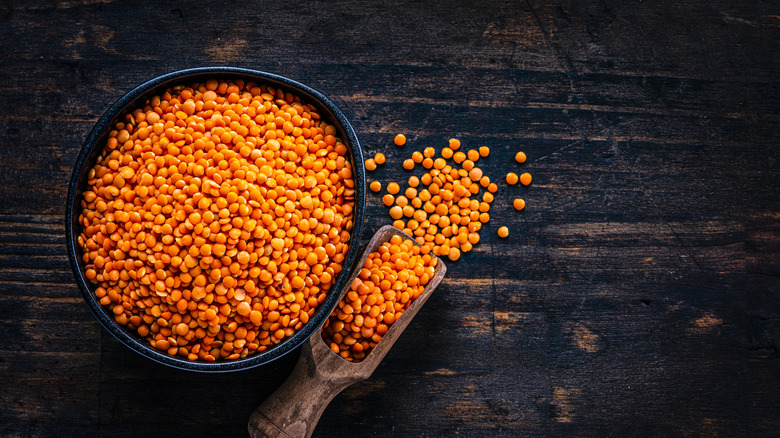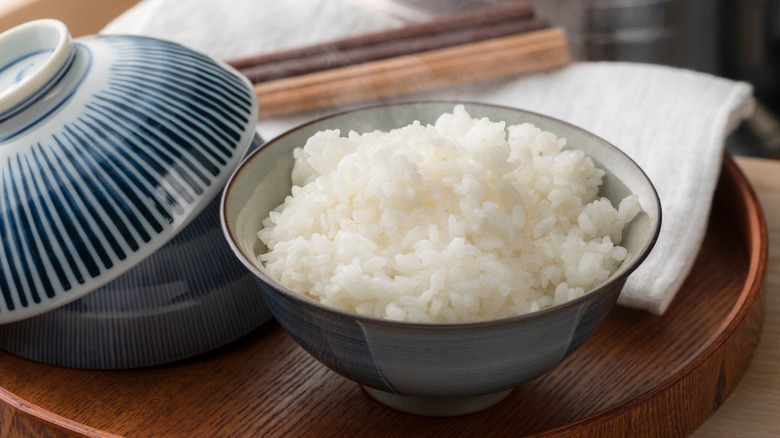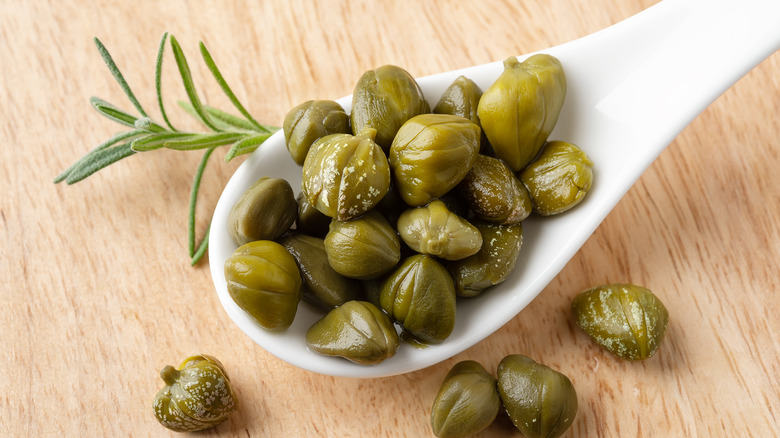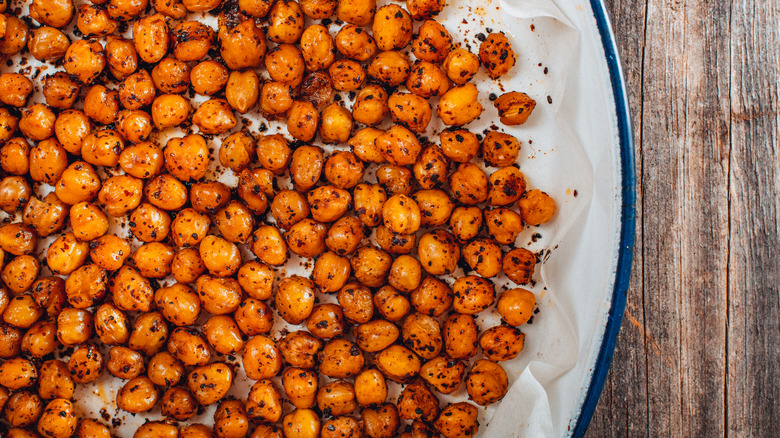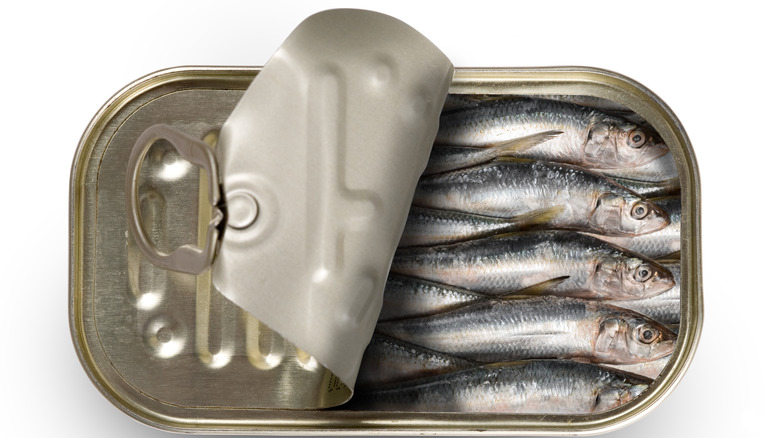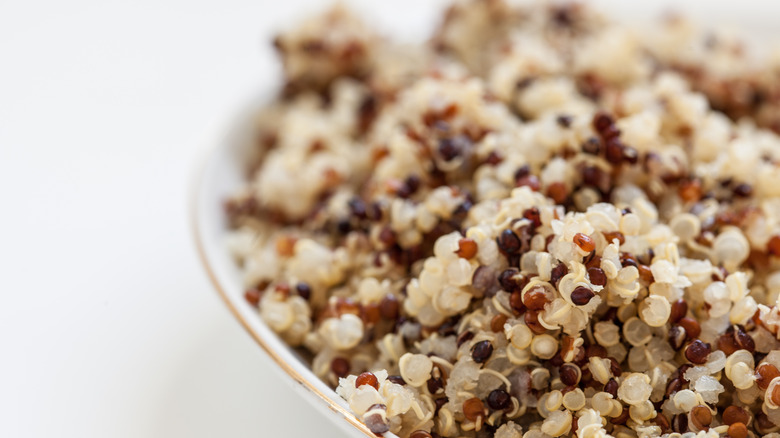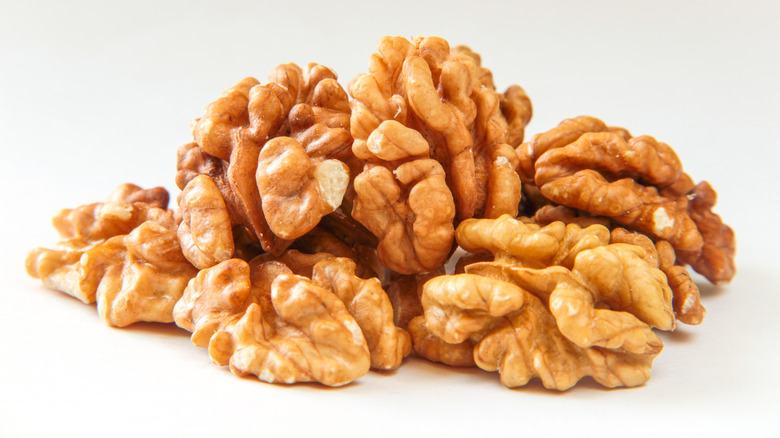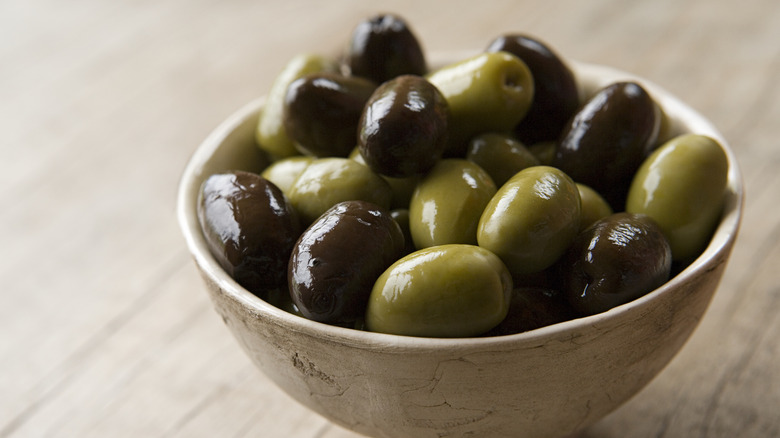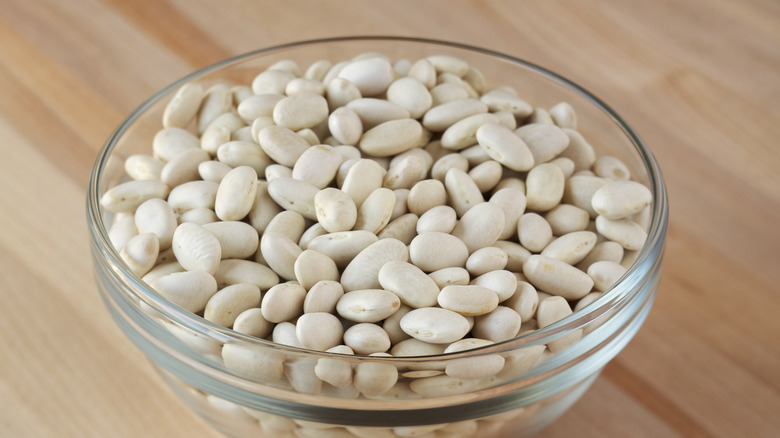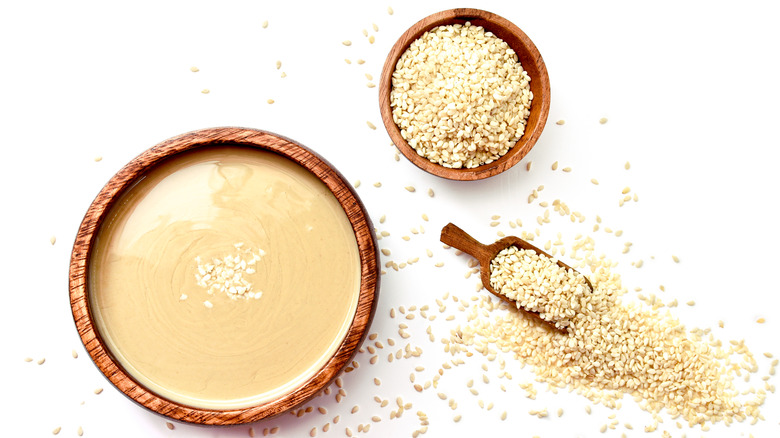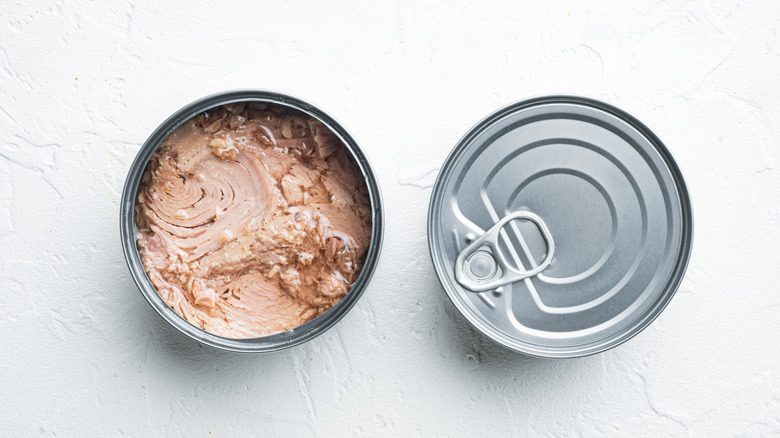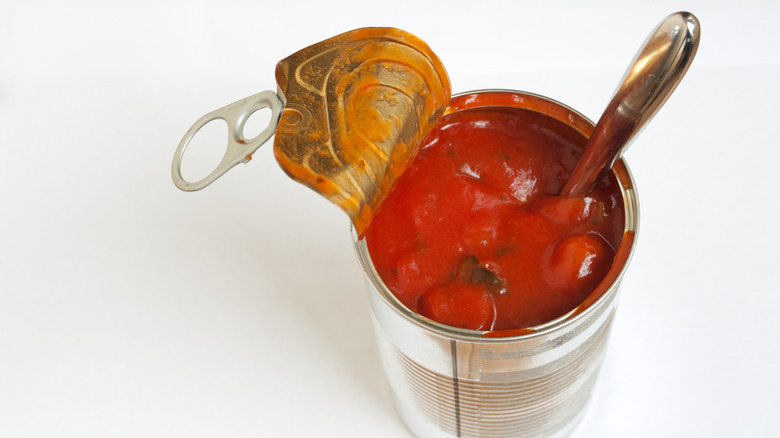18 Best Pantry Staples To Have For A Mediterranean Diet
There are countless diets out there, from carb-limiting keto to low-fat, high-carb raw foods. But often people find these diets restrictive, and for some, they can even be dangerous. If your main concern is eating a diet that will help you live a long, healthy life, there's one specific easy-to-follow regimen you should consider: the Mediterranean diet. U.S. News and World Report ranked it as the best diet of 2023, and it has reigned as such in various circles for many years because of its science-backed health benefits. Following this type of diet is believed to possibly reduce the risk of diabetes, dementia, breast cancer, and even depression. The best part? It's less of a diet than it is a lifestyle.
Those who follow a Mediterranean diet cook a lot of legumes, fruits and vegetables, whole grains, seafood, and healthy fats like olive oil. However, meat and saturated fats should be limited. Red meat is generally only used as a flavor enhancer, not as a main course.
Interested in trying the Mediterranean diet for yourself? The first step is making sure your pantry is stocked with everything you need to succeed. Here are some of the mandatory pantry staples to have for a Mediterranean diet.
Olive oil
If you've spent any time in a Mediterranean country, you know that olive oil is a common food. So, it shouldn't come as a surprise that it's absolutely essential for a Mediterranean diet. Olive oil is where the majority of your fat should come from on this diet, so it's always a good idea to have some on hand. You can use it to create sauces and marinades to flavor your seafood and vegetables, or keep it simple and just dip some bread. It's perfect for sautéing a wide range of foods, and it can even be used as a salad dressing on its own.
Good, quality olive oil will taste bitter and almost spicy — this means it's fresh. You won't want to keep your olive oil in the pantry for too long, however, as it can start to taste bad and lose its flavor if it sits for too long on the shelf.
Red wine vinegar
Where there's olive oil, there is typically vinegar, which is why you'll want to grab some red wine vinegar for your pantry. This is another common ingredient in Mediterranean diets, and it can add a ton of flavor to an otherwise simple dish. It cuts through fatty foods, creating a brightness that can balance out an especially rich dish. Plus, it makes an excellent addition to salad dressings.
Balsamic vinegar is also a common staple in Mediterranean diets, but red wine vinegar seemingly has many more practical uses. The rich, intense flavor of balsamic limits its usefulness in the kitchen more often than not. So, if you have to choose just one, pick up a bottle of red wine vinegar for your pantry.
Couscous
Since you're not going to be eating a ton of meat on the Mediterranean diet, you'll want to make sure to eat plenty of grains to stay full and satisfied. There are a ton of different grains to choose from, but couscous might be the best. It's one of the most versatile carbs out there, which means you can pair it with just about anything. Keep it simple and pile the couscous with sautéed vegetables, or use it to put some extra texture in a fresh salad. It's a great alternative to pasta or rice.
Plus, couscous is great when there isn't a ton of time to dedicate to making dinner. Just pour some hot water on it, let it sit for a few minutes, and serve the couscous with some toppings. What's not to love about such efficiency?
Jarred artichokes
When following the Mediterranean diet, it's a good idea to have some extra vegetables on hand. However, most produce goes bad fast, which can result in nothing fresh in the fridge to eat. That's why it's always a good idea to keep some canned or jarred veggies on hand. One favorite is artichokes in a jar. Artichokes can be added to salads for a soft, velvety texture, or they can become the star of the show in a pasta dish. Eat them as a snack, a meal enhancer or the star of the show itself.
Jarred artichokes are also wonderful to have on hand because they are a way to get the vegetable into a diet without having to go through the labor-intensive hassle of cutting out the hearts when making it from scratch.
Anchovies
Fish is a staple in the Mediterranean diet, but it can be expensive to buy big cuts of tuna and salmon all the time. That's why we're such big fans of anchovies. It's an inexpensive way to get more fish into your diet, and it's a delicious addition to any meal you want to kick up a notch. Of course, you can eat anchovies right out of the can, but they're at their best when melted down in some olive oil and added to a pasta or vegetable dish. Worried that they're going to make your food taste too fishy? That shouldn't be a problem — most likely, they'll just add a savory saltiness to whatever you're cooking.
Anchovies are also one of the more sustainable fish you can eat. So, choosing it over other, larger types of fish is better for the environment. Anchovies contain less mercury than many other types of seafood, another reason it's a smart choice to not say hold the anchovies.
Almonds
Nuts are another integral part of a Mediterranean diet, which is why almonds are a must-have on hand. These nutrient-rich nuts pack plenty of healthy fat, and they are believed to reduce the likelihood of coronary disease and diabetes. But perhaps just as important, they are a dependable, flavorful addition to any meal that needs a bit of crunch. Slivered almonds are amazing on salads, while whole almonds can kick a bowl of morning oatmeal up a notch. They can be baked into breads and cakes, or perhaps crushed and sprinkled on top of a favorite dessert.
Of course, almonds also make a quick and easy snack to take on the go, which in and of itself seems like a good reason to keep them around.
Lentils
Lentils and other types of pulses are among the most important elements of a Mediterranean diet, for a variety of reasons. They pack plenty of protein, they are quite inexpensive, and lentils are also simply delicious. Use them as a flavorful addition to soups, stews, and stir frys. But don't forget, they cam also make a tremendous base for some dishes, or could even be served alongside rice for a nutrient-dense, balanced meal. In all honesty, it's hard to go wrong with lentils on your side.
While there are a few different types of lentils, you're most likely to encounter the brown, green and red varieties. They have slightly different flavors and textures, and vary in taste subtleties, preparation time and foods they typically tend to accompany.
Rice
Whole grains are an essential part of any diet, but they play an especially important role in the Mediterranean. One of the best whole grains to incorporate into the Mediterranean diet is brown rice, although the white variety is a perfectly acceptable substitute for those who prefer its taste and texture. Rice can provide a base for a stir fry, a salad or even a soup, so it's always good to have some on hand.
Rice is also an affordable pantry staple; if you're attempting to eat a Mediterranean diet on the cheap, it's a must-have. Trying to get the best possible deal? Buy rice in bulk, then always keep some available. From basmati to jasmine to the wild variety, there's a rice for everyone.
Capers
Too often, people trying to eat healthy will focus only on staples to meet their macros instead of thinking about flavor, which is partially why some ultimately struggle. But eating a Mediterranean diet doesn't mean someone has to give up on flavor — in fact, it should be the opposite. One common ingredient in Mediterranean cuisine is the humble caper, a tiny, unripened flower bud typically stored in brine, like a pickle. They're intensely flavorful and salty, and can add incredible depth to a wide array of dishes.
Capers can be pricey, especially when you consider that they're not going to provide you with the bulk of your meal. However, they add so much in terms of flavor that it's a good idea to keep some tucked away in your pantry or fridge, if only for those moments where a typical meal needs to be elevated to something transcendent.
Chickpeas
If somebody has only experienced one Mediterranean dish in their lives, there's a very good chance it was likely hummus. Which is made primarily from chickpeas, making the high-in-protein legume a key ingredient in any Mediterranean diet. The Mediterranean diet relies largely on plant-based protein sources, just one of many reasons why chickpeas are such a favorite.
Chickpeas are one of the most versatile foods to keep on hand; crisp them up to add a crouton-like crunch to salad, or simmer them in a tomato sauce and place them on top of rice for a tasty, nutritious treat. Other ideas include adding them to a bean salad, or crafting them into a spread for enjoying with bread. With chickpeas, the possibilities are limited only by imagination.
Sardines
Sure, sardines aren't for everyone. Compared to other types of fish like salmon or tilapia, sardines can have a strong fishy flavor that is simply a turn-off for many. However, if you like briny, salty foods and you're trying to get more healthy fish into your diet, canned sardines are a great place to start. They pack those omega-3 fatty acids that seafood is so celebrated for, and buying a few tins of them isn't going to break a budget.
If you've never had sardines before, you may be wondering how you can use them. They're delicious when served on toasted bread with a spread of some sort and some pickled veggies, and they also shine when served in a lemony pasta. You can also add them to a salad, resulting in some easy protein.
Quinoa
Technically, quinoa is a seed. However, it's widely treated like a whole grain — and there is substantial overlap — so quinoa can play an important role in a Mediterranean diet. Basically, anywhere you can use rice, you can use quinoa. It makes an excellent base for all kinds of dishes where you'd normally use rice. Since it has a different, nuttier flavor profile than rice does, however, quinoa goes the extra mile; it's particularly delicious when crisped in a pan and then used as a salad topping.
Yes, quinoa can be more expensive than rice, so it may not be the ideal choice for those on a budget. But for those looking to add more variety to meals, subbing in quinoa is the way to go.
Walnuts
When following a Mediterranean diet, it's important to eat fat from healthier, more plant-based sources, which is why it's important to keep some nuts nearby at all times. They're not only a great source of healthy fats, but can also be used for snacking and as a way to add a crunchy addition to a dish. Walnuts are one of the best nuts to have on hand because of their firm but smooth texture and light, subtle flavor.
Walnuts are also great for snacking on their own, and made even better when mixed into a homemade trail mix. But don't limit your walnut intake to snack time. Walnuts can be used to add some crunch to salads and more, making them an essential ingredient in any Mediterranean diet-following household.
Olives
When thinking of Mediterranean foods, another delicacy that comes to mind is olives, a staple in many Mediterranean cultures and a great way to get plenty of healthy fats into any diet. They also taste really, really good.
There are several different recommended methods for incorporating olives into daily meals, whether it's adding a can of black beauties to a pizza or carefully chopping Kalamata olives and putting them in a pasta dish. But it doesn't always have to be so complicated. As any self-respecting charcuterie board aficionado will tell you, nothing can compare to a small pile of olives, all different colors, sizes and varieties. Not only are they healthy, but they're also a great way to get filled up and feeling satisfied.
Cannellini beans
You shouldn't assume that you're limited to a certain selection of beans when following a Mediterranean diet — basically any type will do the trick. That being said, not everyone likes the same types of beans. If you're not a chickpea person, maybe black beans will work better for you instead. But if you're trying to find the most versatile bean around, you may want to turn to cannellini beans, which are buoyed by a neutral taste, making them a solid addition to almost any dish without introducing a clashing flavor.
Want to keep things as easy as possible? Opt for canned beans, which don't even have to be cooked before consumption. If looking to save money, buy dry cannellini beans and cook them from scratch.
Tahini
While tahini might be a staple of any favorite hummus recipe, few realize how versatile an ingredient this paste made from sesame seeds can be. If looking for yet another way to add healthy fats into a diet, grabbing a jar of tahini at the grocery store is always a good idea. The sesame seeds give it a subtle nuttiness, which tastes delicious when drizzled over roasted vegetables, stirred into a salad dressing or, yes, blended with chickpeas to make hummus.
Not only does eating tahini help dieters get more healthy fats into their regimen, it also provides a ton of thiamine, vitamin B6, phosphorus, and manganese. Add in a flavor that is both unique and delicious, and you'll always want to have some around.
Canned tuna
The Mediterranean diet calls for plenty of fish, and some may be dissuaded by the high prices of seafood at their local grocery store. Buying fresh fish like tuna can be cost-prohibitive, especially for those eating fish a few times a week. Want to get more fish into your diet without breaking the bank? Stock the pantry with some canned tuna. This is one of the least expensive ways to work more fish into your weekly meal rotation, and you don't even have to cook the fish yourself.
Of course, you can always eat canned tuna on its own, but you can also use it anywhere you would use fresh fish. Make homemade sushi, throw together a creamy tuna pasta, or even make your own poke bowl if you're feeling adventurous.
Canned tomatoes
When navigating a Mediterranean diet, it's crucial to keep as many veggies as possible in the regular rotation. Sometimes this can be difficult, and that's when it's time to be thankful for cans, which come in handy when fresh vegetables aren't around. This can also be key during winter months, when something like fresh tomatoes typically lack that juicy, summery flavor beloved by so many. The health benefits of tomatoes are well-documented, and as part of a Mediterranean diet that effectiveness is amplified.
Surprisingly, in many ways canned tomatoes are no less nutritious than their fresh counterparts. In fact, canned tomatoes contain more of certain types of nutrients than do fresh tomatoes. So, keep some in the pantry and mix them up in soups, pastas, and sauces.
